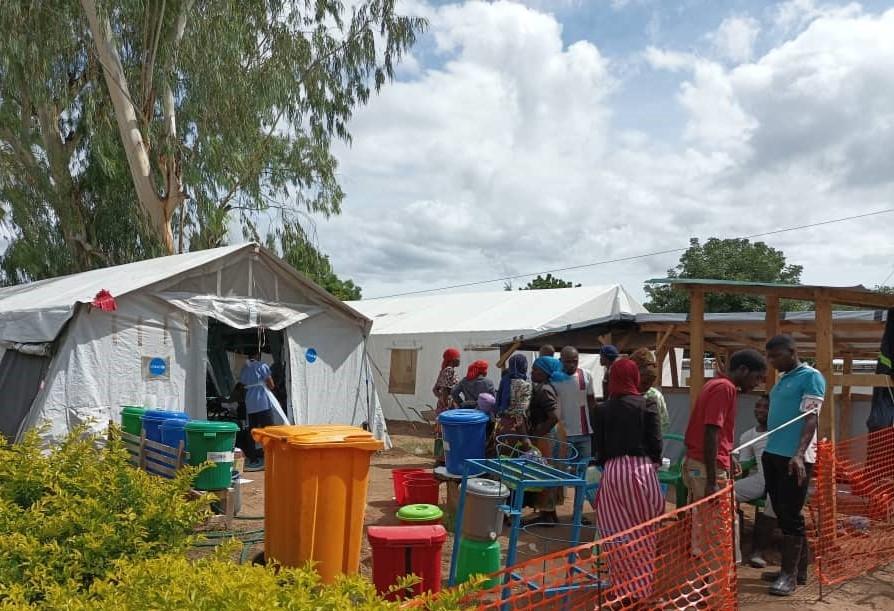Malawi: The worst cholera outbreak in its history

Doctors Without Borders has been supporting the Ministry of Health of Malawi in the response to the outbreak, including setting-up Cholera Treatment Centers like this one in Mangochi district and managing cases of severe and moderate patients. Malawi, 2023. © MSF/Yahya Kalilah
Since 3rd of March 2022, more than 33,600 confirmed people have been reported as having cholera in the country and more than 1,093 people died. While access to water, sanitation, and hygiene remain key factors in sustainably preventing cholera, this crisis also raises the question of access to vaccines in countries where the disease is endemic, such as Malawi, in order to organize preventive targeted vaccination campaigns and avoid outbreaks.
“When the tropical storm Ana hit the south of Malawi in January last year, Doctors Without Borders went to the Nsanje district to respond to the emergency. Following the floods and considering the very poor water and sanitation conditions, we immediately knew that there was a risk of cholera to spread”, explains Marion Pechayre, Head of Mission of Doctors Without Borders in Malawi.
In addition, there had not been massive vaccination campaign against cholera in the country in the last five years and knowing that the vaccine confers immunity for only a few years, the Doctors Without Borders / Médecins Sans Frontières (MSF) team expected that a big part of the population didn’t have immunity anymore. “We expressed our concerns to the Ministry of Health and advised for preventive vaccination campaign in the area to avoid an outbreak. In the future, regular targeted preventive vaccination should be put in place to avoid that”, she says.
In a context of the general increase in cholera outbreaks worldwide (+ 50% in 2022 compared to previous years) and resulting tension on the vaccine stockpile, Malawi, which declared the cholera outbreak on the 3rd March, was only able to start its vaccination campaign by May, reaching only 24.5% of the population of eight targeted districts.
The outbreak of cholera in Malawi stands out as the biggest outbreak the country has seen in its history, after Malawi had made progress in the last several years to reduce the cholera burden through vaccination and improved water and sanitation. However, while these aspects are key to prevent cholera over the long-term, 30% of Malawian don’t have access to drinking water services*, and only 26% have access to basic sanitation services**, which make it challenging to adopt basic hygiene measures in some areas. In Mangochi district for instance, where the disease increased tenfold last November, many people living in rural areas depend on lake Malawi for washing, fishing, cleaning food but also to relieve themselves.
“The lack of safe water, poor food hygiene and low latrine coverage and usage remain unaddressed at community level. With the current rainfall throughout the country, there is a risk of further spread of cholera. To stop this outbreak but also to be better prepared for the future, strong efforts shall be made in this area as well” explains Bérengère Guais, Doctors Without Borders Deputy Head of Emergency.
Supporting cholera vaccination and hygiene activities
Currently, the epidemic trends keep rising, with all districts of the country reporting cases and around 600 new cases per day. While the country usually counts a few hundred cholera patients per year, there are more than 33,600 confirmed cases in this outbreak, which is more than the 33,546 cases Malawi recorded in 2002 during the previous worst epidemic in its history. The high mortality rate in this epidemic, around 3 % (while it is more generally below 1%), is also worrying.
Backing the Ministry of Health in its efforts to slow the spread of the outbreak and reduce the number of deaths from cholera, since last spring Doctors Without Borders has been supporting 13 Cholera Treatment Units, managing more than 6,000 cases of severe and moderate patients. Doctors Without Borders also conducted Oral Cholera Vaccination campaign towards 42,000 people in Mangochi district in December, and just started vaccination in Blantyre district as well.
Water sanitation and hygiene (WASH) activities such as the distribution of water guards and hygiene kits to promote the point of use water treatment and good hygiene practices at the household level were conducted by Doctors Without Borders, as well as epidemiologic surveillance, community engagement and awareness reaching more than 25,000 people, capacity building of health care workers, and donations of medical supplies and items (such as cholera beds, buckets, water guards). Doctors Without Borders maintains its surveillance to respond to the outbreak based on the needs expressed by the health authorities and the assessments conducted by the teams in the country.
* Data from: https://data.worldbank.org/country/malawi?view=chart
** Data from: https://www.unicef.org/malawi/water-sanitation-and-hygiene